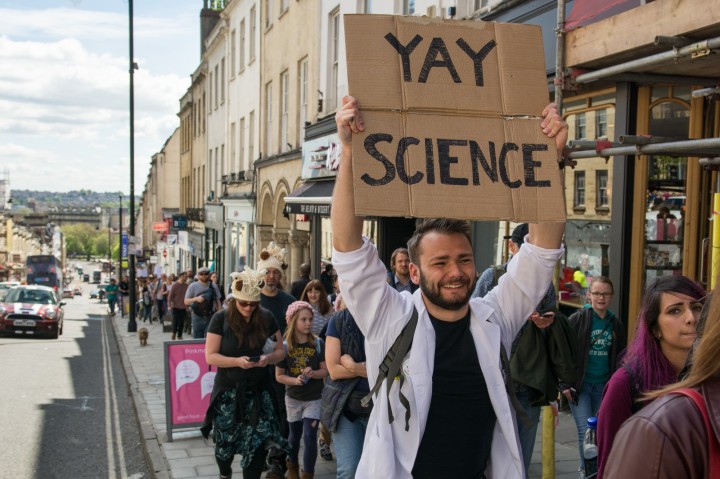By Matthew Lee, University of Bristol
It must be bad if scientists are marching, right?
When I first told people of the March for Science I was met with puzzled looks and throw away questions; “but why?” “what’s the point?”. And, in the first week of the March for Science DC in the US – which spawned over 600 sister movements across the world – being announced I had no answer.
At least I had no answer as to why I, a Brit, would be marching in the UK. In the US they had good reasons to mobilise, many scientists were concerned about the position of the current administration on issues such as climate change and proposed cuts in funding for some research areas. The US public’s opinion on scientific topics also did not align with the scientific consensus – I doubt public opinion has changed much since January 2017 either.
In the UK this isn’t really an issue, no one is imposing media blackouts, research funding isn’t really being hit and public opinion on things like climate change don’t really differ from the scientific consensus.

Members of the public gather before a rally at The March for Science Bristol – The March for Science Bristol/Christy Nunns
Is it really that bad for scientists in the UK?
Our issue is that we are uncertain. Uncertain our colleagues might not be our colleagues much longer. That they may be batted around in the political ping pong of Brexit negotiations is worrying, both personally and for science. Whether forced or voluntary, the potential exodus of scientists to neighbouring countries will harm British science and society – they may leave science altogether.
If you add to this uncertainty around European collaborations, the post-expert society we live in, and the rise of alternative facts* one starts to worry whether anyone, public or politician, will take notice of science in the UK. Will science have a prime spot at the Brexit negotiating table, or will it be far down the pecking order?
To march for these reasons is admirable. But, I, like many scientists, am of the opinion that science should be politically neutral. I believe science should provide information, and people and politicians should be informed so that they can act on that information in the best interests of all. Science is, as I have heard it said before, above politics.
Yet, science has been politicised, not by scientists but by politicians. Discrediting scientists and experts has become de rigueur in populist politics. Politicians no longer change their ideals to fit the science, they now change the science to fit their ideals.
The notion that science can be manipulated and forced to fit through political holes really grates on me. Science isn’t there to fit one narrative over the other, it is there to inform and explain the world around us. Science is there to serve all, it is not there to be manipulated to fit a narrative that goes down well with particular voters (the badger cull springs to mind).

Science activists march up Bristol’s iconic Park Street – The Bristol March for Science/Christy Nunns
Is science a part of society or separate from it?
I volunteer for the British Science Association (BSA), and the reason I do that is because I agree with their vision and mission. They want to see ‘a world where science is at the heart of society and culture’ and want ‘to support, grow and diversify the community of people interested and involved in science; and to strengthen their influence over science’s direction and place in society’.
I truly believe in their vision, it is what I think science should be, it should be a part of everyone’s life. By engaging with the public, we can show people how science impacts their daily lives. By informing the public of the issues science, and scientists, face they will be able to make decisions understanding how it will impact them. By providing the public the resources they need to make sense of science and its place in their lives, we can slowly start to pull back on the politicisation of science and ensure science is a central part of society.
The first step is to tell people about the issues science and scientists face. I not only marched for science in Bristol on Earth Day, but also helped organise the Bristol March for Science. And I had a great time too!

The University of Bristol endorsed March for Science Bristol and researchers took part in public engagement activities – The March for Science Bristol/Bronwen Burton
*Alternative facts are not facts. It is the equivalent of saying a Jaffa cake is a Jaffa cake if it has no jelly centre, it is not. It is a disappointing cake with a thin layer of chocolate and you should get your money back!
About me
Matthew Lee is a Research Technician at the University of Bristol, and when not doing weird things with cancer cells he does weird things with the British Science Association and tells people how much he loves science. You can find more from Matthew by following him on Twitter or visiting his blog when you need something to send you to sleep.
Matthew was the recipient of a 2016 Diversity in Science Grant for ‘Big Bang Bristol’ from the Biochemical Society.


One thought on “I wasn’t sure if I should march for science. I did, and I will march again!”